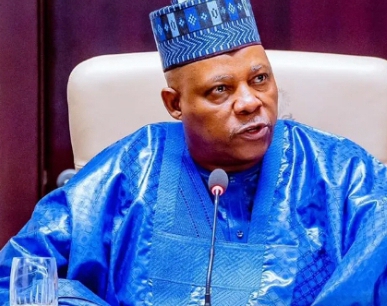Vice President Kashim Shettima has reaffirmed the Federal Government’s commitment to boosting local manufacturing and production as a cornerstone of Nigeria’s economic growth and global competitiveness.
Speaking on Tuesday at the Made in Naija Trade Exhibition organized by the House of Representatives Committee on Commerce, Shettima, represented by his Special Adviser on Special Duties, Dr. Aliyu Modibbo Umar, said the nation’s economic identity and global standing will be defined by what it produces.
“Nigeria’s future rests on the ingenuity, enterprise, and creativity of its people,” he said. “There is nothing that signals national pride more than the craftsmanship, ideas, and innovations of our citizens. They do more than reflect capability they fuel the economy and give life to aspirations yet to be realized.”
Describing the exhibition as more than a showcase of products, Shettima said it is “a statement of intent” reflecting the government’s dedication to turning Nigerian brands into globally recognized names.
He highlighted that Nigeria’s wealth lies not only in oil, fertile land, or minerals but in its human capital the ability of citizens to transform resources into value. “Our fortune lies in ambition that turns potential into prosperity,” he added.
The Vice President urged Nigerians to support local products, noting that consumption of Nigerian-made goods creates jobs, strengthens the naira, reduces import dependence, and nurtures a sustainable middle class. “It is not sufficient to make; we must also buy Nigerian,” he stressed.
Shettima further outlined government initiatives, including infrastructure development, financing reforms, special economic zones, and compliance with international standards, aimed at positioning Nigerian products as globally competitive.
“Choosing Nigerian products is a declaration of confidence in our talent and a commitment to shaping our global identity, not letting others define it for us,” he said.
Speaker of the House of Representatives, Rt. Hon. Abbas Tajudeen, lauded the exhibition as a timely effort to promote industrial growth and economic self-reliance under the Nigeria First Policy and the AfCFTA framework. “Reducing import dependence is not just economic it is a national duty. Every choice of Nigerian-made goods strengthens our economy and affirms our national identity,” he said.
Hon. Ahmed Munir, Chairman of the House Committee on Commerce, emphasized the economic impact of prioritizing local manufacturing. He projected that local content initiatives could generate over five million jobs by 2030 and save Nigeria up to $20 billion annually in foreign exchange, contributing an estimated five percent to GDP within five years.
“Our vision is global. Nigerian products must compete not only in Lagos or Abuja but in London, Beijing, and New York. Step by step, brick by Nigerian-made brick, we are building a strong economic base that will sustain growth, attract investment, and ensure long-term prosperity for our nation,” Munir concluded.

